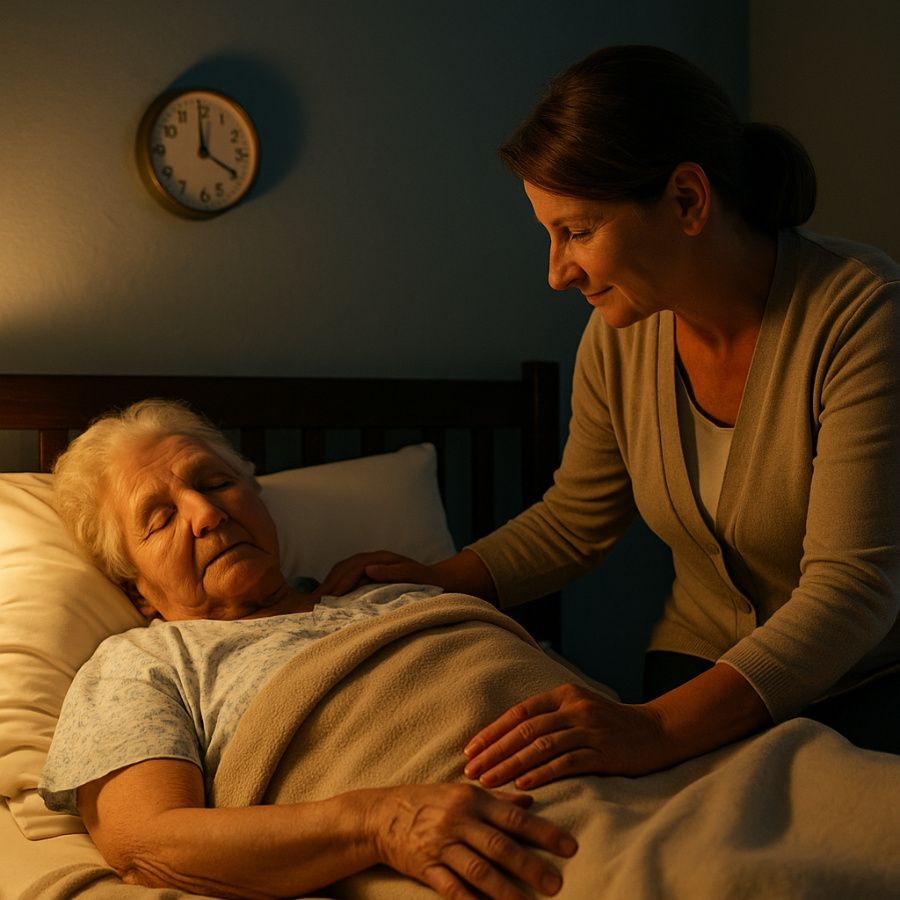Dementia and sleep problems often go hand in hand, creating daily challenges for both patients and caregivers. Sleep disturbances such as insomnia, night wandering, and frequent awakenings are commonly reported in people living with dementia. Left unmanaged, poor sleep can worsen cognitive symptoms, increase fall risks, and lead to caregiver burnout.
Understanding the causes behind sleep disruptions and learning effective remedies is essential for improving overall well-being.
In this article, we explore the key factors contributing to sleep issues in dementia and provide practical, non-medication-based strategies to manage them naturally.
🧠 Why Do Dementia Patients Have Sleep Problems?
Sleep-wake cycles are regulated by the brain’s suprachiasmatic nucleus, which can become damaged in dementia—especially Alzheimer’s disease. This disruption leads to circadian rhythm imbalances, causing confusion between day and night.
Other common causes include
- Sundowning syndrome: Agitation and confusion in the late afternoon or evening
- Pain or discomfort: Conditions like arthritis, urinary infections, or indigestion
- Medication side effects: Certain drugs can cause drowsiness during the day and restlessness at night
- Sleep apnea or restless legs syndrome: Often underdiagnosed in dementia patients
Related article: Sundowning and Dementia: A Guide to Understanding and Coping
🌿 Natural Remedies to Improve Sleep
Rather than relying on sleeping pills, which can increase fall risk and confusion, caregivers can apply simple, holistic methods to help dementia patients rest better.
1. Create a Calming Night Routine
- Turn off bright lights and loud noises after sunset
- Use lavender oil diffusers or calming herbal teas
- Play soft music before bedtime (Music Therapy for Dementia Patients is also effective)
2. Encourage Daytime Activity
- Gentle physical exercises can reduce napping and improve nighttime sleep
- Try these physical exercises for dementia patients to promote energy balance
3. Limit Caffeine and Fluids
- Avoid coffee, tea, and sugary drinks after 3 PM
- Minimize fluid intake in the evening to reduce nighttime urination
4. Stick to a Consistent Schedule
- Wake and sleep at the same time daily, even on weekends
- Use an activity calendar for dementia patients to create structure
🛏️ Safe Sleep Environment for Dementia Patients
Setting up a safe and comforting sleep space can significantly reduce anxiety and restlessness.
Tips for a Better Sleep Environment
- Use nightlights to reduce disorientation
- Install door locks for dementia patients if they tend to wander at night (see options)
- Ensure room temperature is neither too hot nor too cold (Feeling cold in dementia patients is a common issue)
💊 Should You Use Medication?
Sleep medications may be prescribed for short-term use but must be approached with caution. Some can cause confusion, grogginess, or worsen memory loss. Always consult a healthcare professional before starting any sleep aid.
Instead, look for natural solutions such as
- Melatonin supplements (only with doctor’s advice)
- Magnesium-rich diets to promote relaxation
- Mindfulness and relaxation techniques (Self-care routines for anxiety may be beneficial)
📈 When to Seek Medical Help
If sleep issues persist or worsen, consult a doctor immediately. Conditions such as
- Sleep apnea
- Urinary tract infections
- Depression or anxiety
could be underlying causes of nighttime agitation.
Also, track sleep habits using journals or smart devices to help doctors evaluate patterns effectively.
🧩 Supporting Caregivers
Caring for a dementia patient who doesn’t sleep can be physically and emotionally draining. It’s important for caregivers to prioritize their own rest and consider professional respite care when needed. Learning about dementia through resources such as fun and stimulating activities can make caregiving less stressful and more rewarding.
🧠 Final Thoughts
Dementia and sleep problems are deeply interconnected, but with the right knowledge and techniques, caregivers can dramatically improve sleep quality. From establishing structured routines and using calming remedies to ensuring safety and comfort at night, small changes can yield big results.
By choosing a natural and holistic path—one that aligns with the body’s rhythms and needs—caregivers can enhance not just sleep but the overall quality of life for dementia patients.
🔍 Frequently Asked Questions (FAQs)
Why do dementia patients get worse at night?
This is known as sundowning, a common symptom due to disrupted circadian rhythms.
What is the best natural sleep aid for dementia?
Melatonin and magnesium, combined with a calming bedtime routine, are helpful.
Can music help dementia patients sleep better?
Yes, soft, calming music can relax the mind and body. Try music therapy.
How much sleep does a dementia patient need?
Typically 7–8 hours per night, though it may be fragmented.
Are sleep disturbances early signs of dementia?
They can be, especially in Alzheimer’s disease, where changes in sleep patterns may appear early.
What foods help dementia patients sleep?
Magnesium-rich foods like spinach, almonds, and bananas promote relaxation.
Should dementia patients nap during the day?
Short naps (30 minutes max) are okay; long naps can worsen nighttime sleep.
Can poor sleep worsen dementia symptoms?
Yes, chronic sleep deprivation can increase confusion, agitation, and memory loss.
What’s the safest way to monitor a dementia patient at night?
Motion sensors, cameras, and using secure door locks help prevent accidents.
Can sleep improve brain function in dementia?
Good sleep can help stabilize mood, reduce inflammation, and support cognitive function.
